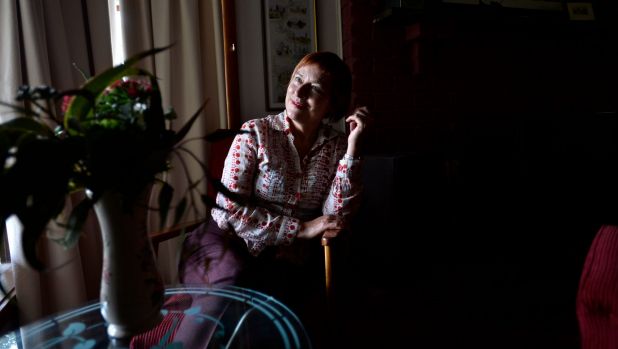More Australians are dying from the effects of hepatitis C than ever before, while the spread of syphilis has reached a record high.
New data from the University of NSW, to be released on Thursday, found 630 Australians died from illnesses caused by hepatitis C last year, more than double the rate a decade ago. There were 150 deaths in Victoria.
 Former sufferer Jen Anderson says drugs for treating hepatitis C should be subsidised. Photo: Justin McManus
Former sufferer Jen Anderson says drugs for treating hepatitis C should be subsidised. Photo: Justin McManus
Hepatitis C is a blood-borne virus commonly caught by injecting drugs or getting tattoos and piercings. It can also be transmitted between a mother and baby and during sex if there is blood present.
Large numbers of Australians got the virus two or three decades ago, with the impacts becoming evident as liver damage from having hepatitis C causes illnesses including cancer.
David Wilson, an academic from the university’s Kirby Institute, said he expected the rise in deaths to continue.
“There are a lot of people who are progressing in their disease, it’s going to get a lot worse in years to come and we do not really have the strategies or the will to make a big difference about it,” he said.
UNSW social health researcher John de Wit said young people and gay men were most at risk of getting hepatitis C because they are more likely to inject drugs or know people who do.
There was a stigma around injecting drugs which could prove a barrier to people seeking treatment, he said.
New medication for hepatitis C has a 95 per cent cure rate and is likely to become available in Australia within the next couple of years.
But Dr Wilson said the federal government would face tough questions in deciding whose treatment to subsidise, with each course costing $80,000.
Treating prisoners and drug users may be the best way to get the epidemic under control, he said.
Melbourne violinist Jen Anderson was diagnosed with hepatitis C in 1994, but was cured after a 20-week treatment program in 2010.
She said many people living with the virus were reluctant to seek treatment because the side-effects could be debilitating. The new, better drugs should be subsidised for everyone, Ms Anderson said.
She said she had been reluctant to to talk about having hepatitis C outside the music community, who were more accepting, fearing she may be discriminated against.
“When I got the news that I’d received a cure, it was a huge weight off my shoulders and I realised that in fact probably subconsciously it had really been affecting me for all those years,” she said.
The Kirby Institute study also showed Australia’s highest ever recorded rate of syphilis.
The disease is widely thought of as an old and rare one. In the 1990s the number of Australians being diagnosed with syphilis was “almost non-existent”, Dr Wilson said.
Last year clinicians diagnosed more than 1760 Australians with the disease, a 34 per cent increase since 2009. Nearly 600 of those people were in NSW and more than 650 were Victorians.
